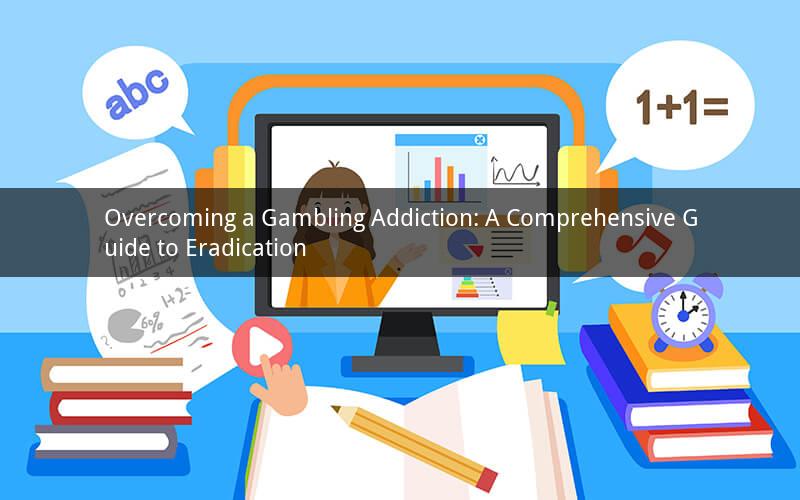
Introduction:
Gambling addiction is a severe issue that affects millions of individuals worldwide. It can lead to financial, emotional, and social consequences. This guide aims to provide a comprehensive overview of the best steps to eradicate a gambling problem, offering strategies and resources to help individuals overcome this challenging addiction.
1. Understanding the Problem:
To effectively address a gambling addiction, it is crucial to understand its nature and impact. Here are some key points to consider:
a. Recognize the Signs: Identifying the symptoms of gambling addiction is the first step towards overcoming it. These signs include lying, secretive behavior, financial difficulties, neglecting responsibilities, and a preoccupation with gambling.
b. Acknowledge the Consequences: Understanding the negative consequences of gambling addiction can motivate individuals to seek help. These consequences may include loss of relationships, job termination, financial ruin, and even legal problems.
2. Seeking Professional Help:
Seeking professional help is a vital step in eradicating a gambling problem. Here are some options:
a. Therapists and Counselors: A therapist or counselor specializing in gambling addiction can provide personalized guidance and support. They can help individuals understand the root causes of their addiction and develop coping strategies.
b. Support Groups: Joining a support group, such as Gamblers Anonymous, can provide a sense of community and understanding. Members share their experiences, offer support, and provide practical advice for overcoming addiction.
3. Developing a Treatment Plan:
A tailored treatment plan is essential for overcoming a gambling addiction. Here are some key components:
a. Cognitive-Behavioral Therapy (CBT): CBT helps individuals identify and challenge negative thoughts and beliefs associated with gambling. It focuses on developing healthier coping mechanisms and reducing the urge to gamble.
b. Medication: In some cases, medication may be prescribed to help manage the psychological symptoms of gambling addiction. Antidepressants, mood stabilizers, and anti-anxiety medications are potential options.
c. Financial Management: Addressing the financial aspects of gambling addiction is crucial. This may involve seeking help from a financial advisor, creating a budget, and exploring debt management options.
4. Building a Support Network:
Surrounding oneself with a supportive network is vital in overcoming a gambling addiction. Here are some ways to build a strong support system:
a. Family and Friends: Openly communicating with loved ones about the addiction and seeking their support is essential. They can provide emotional support, encouragement, and accountability.
b. Professional Support: Engaging with professionals, such as therapists, counselors, and support group members, can offer ongoing guidance and support throughout the recovery process.
5. Creating a Safe Environment:
Eliminating triggers and creating a safe environment can aid in overcoming a gambling addiction. Here are some strategies:
a. Avoiding Triggering Situations: Stay away from places that may encourage gambling, such as casinos, racetracks, or online gaming platforms.
b. Removing Access to Gambling: Delete gambling-related apps, block gambling websites, and avoid socializing with individuals who engage in gambling.
6. Establishing Healthy Habits:
Developing healthy habits can help reduce the urge to gamble and promote overall well-being. Here are some suggestions:
a. Engaging in Physical Activity: Regular exercise can improve mood, reduce stress, and provide a healthy outlet for negative emotions.
b. Pursuing Hobbies: Focusing on hobbies or interests can provide fulfillment and distract from the urge to gamble.
c. Mindfulness and Relaxation Techniques: Practices such as meditation, deep breathing exercises, and yoga can help manage stress and reduce the urge to gamble.
7. Staying Committed to Recovery:
Overcoming a gambling addiction requires dedication and commitment. Here are some tips to stay on track:
a. Set Clear Goals: Establish specific, achievable goals to guide the recovery process. These goals can include attending therapy sessions, participating in support groups, and building a healthy support network.
b. Celebrate Progress: Recognize and celebrate milestones along the journey to recovery. This can help maintain motivation and reinforce positive behavior changes.
c. Maintain Patience: Recovery is a gradual process, and setbacks may occur. It is important to maintain patience and resilience, understanding that progress takes time.
Conclusion:
Eradicating a gambling problem requires a comprehensive approach that addresses the psychological, financial, and social aspects of addiction. By seeking professional help, developing a tailored treatment plan, building a supportive network, creating a safe environment, establishing healthy habits, and staying committed to recovery, individuals can overcome their gambling addiction and lead a fulfilling life.
Questions and Answers:
1. What are the signs of a gambling addiction?
Answer: The signs of a gambling addiction include lying, secretive behavior, financial difficulties, neglecting responsibilities, and a preoccupation with gambling.
2. How can seeking professional help aid in overcoming a gambling addiction?
Answer: Seeking professional help, such as therapy or counseling, can provide personalized guidance, identify the root causes of addiction, and develop effective coping strategies.
3. What role do support groups play in overcoming a gambling addiction?
Answer: Support groups, like Gamblers Anonymous, provide a sense of community, understanding, and practical advice. Members can share their experiences and offer mutual support.
4. What are some strategies to create a safe environment for overcoming a gambling addiction?
Answer: Strategies to create a safe environment include avoiding triggering situations, removing access to gambling, and engaging in healthy habits like exercise and mindfulness.
5. How can individuals maintain commitment to recovery from a gambling addiction?
Answer: Maintaining commitment involves setting clear goals, celebrating progress, staying patient, and seeking ongoing support from professionals and support networks.